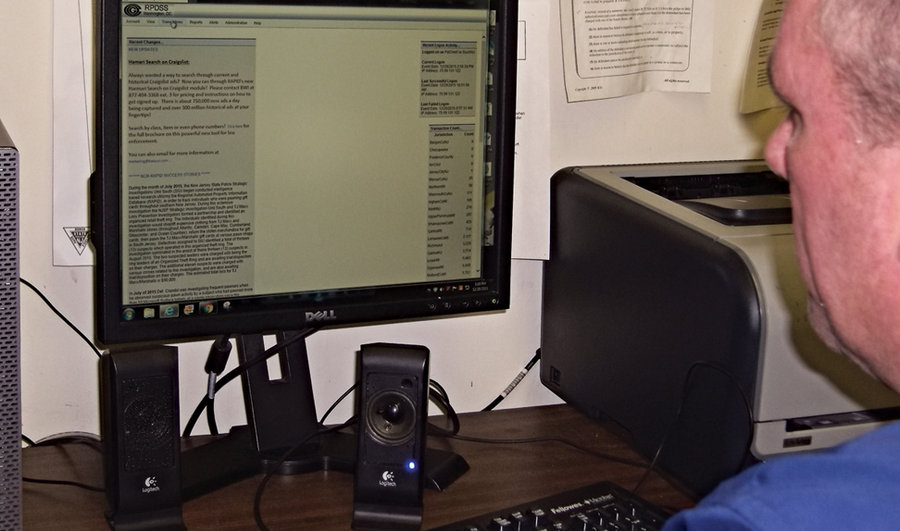The Bayonne Police Department has joined statewide and national movements to transition from paper records to technology in the registering and tracking of jewelry and other valuables resold to merchants.
The BPD has joined RAPID, the Regional Automated Property Information Database, an internet-based computer system that electronically delivers transaction information from pawn, second-hand, and precious metal businesses to law enforcement agencies.
Bayonne, Jersey City, and Belleville are among the first municipalities in North Jersey to adopt the program. Police departments in Ocean and Monmouth counties, and other central and southern New Jersey locations, already have the program up and running. This is in part because of the need to deal with problems associated with heroin epidemics in those communities. Stolen items are often pawned or resold to feed drug habits.
In the past, businesses in the city were required to maintain a ledger for all transactions and to report the details on an index card, which was mailed to the police department.
“This system requires the subject businesses to report the transactions electronically over the internet,” said Bayonne Police Capt. George Farley of the department’s ABC (Alcohol Beverage Control) unit.
The problems with the old system were that information was not in a centralized location for multiple police departments to access and there was no way for other departments investigating robberies or burglaries to actually see suspected stolen items.
“Detectives will no longer have to visit individual businesses for stolen property. Transactions will be viewed at their desktop or mobile device.’” – Capt. George Farley
____________
Both of those have changed with RAPID, a comprehensive system that is accessible to all police departments which have signed up for it. Posted pictures can be seen by multiple departments because the system is internet based.
“This system makes use of current technology and assists our investigators in being more efficient and effective,” Farley said. “Detectives will no longer have to visit individual businesses for stolen property. Transactions will be viewed at their desktop or mobile device.”
Last year, Bayonne detectives cracked the case of multiple burglaries at the Alexan CityView apartment complex by visiting North Hudson pawn shops and finding items taken during the commission of some of those crimes. The RAPID system would have aided in that investigation.
Bayonne moved to the new technology by passing an ordinance in the fall that allowed for the updating of the system.
Affected businesses
Affected businesses include dealers who buy precious metals and certain secondhand goods for resale. Nonprofit and charitable organizations are exempted from the new ordinance.
Bayonne became interested in the new program after Police Chief Drew Niekrasz learned of it at a chiefs of police conference at the shore.
“He felt it would be best to get on board and be ahead of the curve,” Farley said.
Giving police the ability to view items instantly is important because those taking used items have to keep them only 10 days before selling them. So time is important when police are trying to track stolen items.
About 20 stores in Bayonne will be affected by the new ordinance; one pawn shop, several jewelers, and certain cell phone and computer gaming stores.
It is anticipated that all affected businesses will be in compliance by mid-spring.
Next steps for program
“Right now, we’re in an important phase where all the store owners will be contacted and we’ll develop a list, and we’ll send them out information about the advantages of the system,” Farley said. “They’ll call and we’ll set them up in store.”
The ABC Unit will be conducting background checks on all businesses subject to the ordinance. They will also ensure that such businesses comply with the ordinance. Failure to comply can result in a fine, temporary suspension, or complete revocation of license, depending on the number of infractions.
Federal forfeiture funds will be used to defer the first-year startup costs associated with this new program for affected businesses.
BPD will use forfeiture funds to pay for the first year of the system and digital cameras.
During the second year, stores will pay for the cost of maintenance. The businesses pay for the licensing fee each year.
A number of Bayonne detectives and ABC unit officers will undergo the necessary half-day training.
As more and more state police departments buy into the RAPID system the more successful it will be.
“The program only really works optimally when all law enforcement agencies are involved with it,” Farley said.
Joseph Passantino may be reached at JoePass@hudsonreporter.com.
